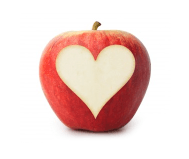As I have taken on this new venture of nutrition coaching, I have come to realize people are really overwhelmed with all the crazy diet info out there. I mean what is good nutrition? Should we eat grains or not? Should we consume dairy? Should I go vegan or paleo? What I always tell my clients is there is no perfect diet…. You need to customize the meal plan that is right for you and your lifestyle. So what does a good nutrition plan look like? It varies a bit from person to person. But what I tell all my clients is that your nutrition program should include foods that YOU enjoy. If you don’t incorporate foods you enjoy then it becomes a diet vs a lifestyle and we all know diets don’t work.. I mean seriously the first 3 letter spell DIE!!! That said, there are some aspects that should be included in your diet. Don’t be afraid to explore and figure out what works best for you. Here are some rules that I try to stick to when deciding what to eat. 1. Portion Sizes: This is by far the one I have the hardest time sticking to! I eat several meals throughout the day, so it is especially important to be aware of portion sizes when you do this. Otherwise you end up with 5-6 huge meals and an excess of calories. If you aren’t sure what a portion size looks like measure it. Three foods that I find shocking when measured are cereal, pasta and granola. Because these are usually trigger foods for me.. I personally stay away from them.. but if you enjoy them you can keep a little sandwich baggie with a 1/4 cup portion size . You don’t have to do this with every food, but if there is something you know you tend to overeat measure it out until you learn to recognize the portion size. I also love pre portioned almond packs, yogurt, cottage cheese and almond butter packs. These are already pre portioned for you! 2. Eat Vegetables:When you fill your plate, aim to make half of that vegetables. I eat 4-5 meals a day.. and I have veggies at each and every one. Well maybe not breakfast. Vegetables are full of nutrition and fiber, and most of them are naturally low in calories. The more colors you incorporate into your day the bigger the variety of nutrients you are consuming. Vegetables will help keep you full longer, and help prevent overeating. An added bonus of crunchy vegetables (carrots, celery, etc) is that they take longer to chew, which can help your body recognize satiety (fullness) signals more quickly. 3. Eat Protein: Protein will help your muscles grow stronger and repair more quickly. It also helps keep you full and satisfied throughout the day. Research is variable on the amount of protein you should consume per day. However, most people trying to build lean muscle aim for 1 gram per pound of desired body weight. One serving of meat should be approximately the size of your palm or a deck of cards. Leaner cuts of meat are typically lower in saturated fat. A great go to for dinner would be a lean protein like grilled chicken, a nutrient dense carb like sweet potato and dark green vegetable like broccoli. I love this and its a staple for me at least 3 or 4 nights a week. 4. Satisfy Your Sweet Tooth: Whoa! Did I really just say that? I sure did. I eat a quest bar daily. I know this isn’t the healthiest.. but it satisfies me and it suppresses the sugar monster from raiding the cabinets late at night. Deprivation never works long term. Remember, you can satisfy your sweet tooth while eating clean. If you let the cravings build without ever appeasing them it can lead to binge eating of very unhealthy items. Also, a “diet” will only work if it is a lifestyle change that you are able to stick to. For most of us that means we need to incorporate in some sweets. Don’t be afraid to try some healthy versions of your favorite dessert. You just might like it! 5. Log Your Food: . Food is fuel for your body. To little food and you catabolize your muscle, which increases your body fat percentage. To much food and you become sluggish and consume extra calories which can lead to weight gain. Many people find counting calories useful, but it can become something that people get hung up on or start doing compulsively. If you are one of those people it’s probably better to just skip number 5. Having a healthy approach toward food will get you results faster, and keep you saner than counting calories. I log my food at the end of the day when I am done eating. That helps me keep the log as a tool for learning, and not something to get fixated on. I will say this.. Most of my clients who do some kind of tracking become much more aware of what they are actually consuming and that is key. They get a much better sense of what a portion size truly is, they become aware of the macro content ( carbs fat and protein) and they usually realize that exercise doesn’t really burn as much as we think it does! So thats it my friends … keep these little nuggets in your noggin Especially now around the holidays 🙂


